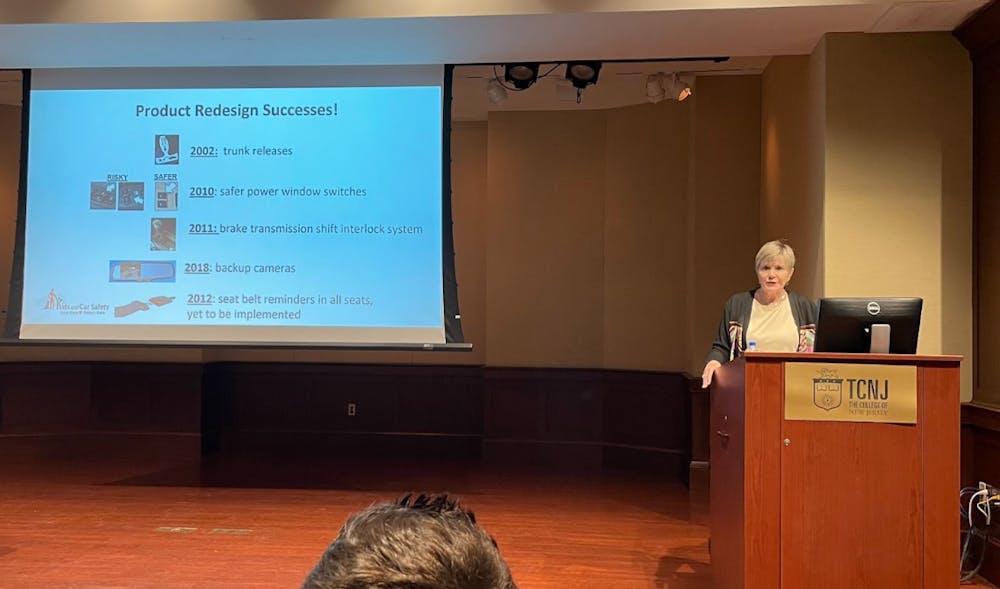By Emma Ferschweiler
Staff Writer
Founder and president of Kids and Cars Safety (KACS) Janette Fennell spoke to the College in the library auditorium on Nov. 1 about how she turned her dramatic kidnapping story into a career advocating for vehicle-related risks. Fennell touched upon topics regarding car safety, as well as the concerns her organization has addressed.
KACS is a national non-profit organization that works to keep children and animals safe in and around vehicles. Fennell started off her talk by sharing the incident that led to her passion for vehicle safety and the foundation of this organization. A couple of days before Halloween in 1995, two masked strangers forced Fennell and her husband at gunpoint into the trunk of their car, leaving the couple’s 9-month-old son abandoned at the front of their house.
The ordeal lasted hours accompanied by assaults, death threats and personal information being stolen until Fennell, calling it divine intervention, found the trunk release. They were eventually reunited with their baby after discovering that he was not in the backseat but with police at the house.
“I said we need to do something about this, this is crazy,” Fennell said. “How can you put someone in their own trunk, and they can’t get out. One of the ideas [was to] put a little glow-in-the-dark trunk release… that’s what we did.”
Every car that has been made since Sept. 1, 2001, is mandated to be made with emergency trunk releases by the U.S. National Highway Traffic Safety Administration (NHTSA). This initiative was the first of many changes in vehicle safety made possible by Kids and Cars lobbying efforts.
Some of the most notable features seen in modern cars are safer power window switches, brake shift interlocks and backup cameras. There are still redesigns the organization hopes to push forward, such as seat belt reminders in all seats and a detection system to remind parents when children or animals are left in the car.
“I just tried to get in trunk releases but then you know there’s an issue and you know how you can help to prevent it… knowing none of us had data on it that’s what really really kept me going, and I’ll guess we’ll say the rest is history,” Fennell said.
KACS prioritizes data collection and analysis to figure out the safety problems facing the vehicle industry. Fennell explained that there was little research regarding some of the problems she hoped to tackle, including backovers and heat stroke. Collaboration with hospitals and the University of California provided this missing information and led to safety redesigns in cars.
KACS is working with the College’s Mentored Undergraduate Summer Experience (MUSE) to address their most recent concern of hot car deaths caused by parents forgetting children in the car. University at Buffalo associate professor of sociology, Dr. Mary Nell Trautner started this conversation with KACS before reaching out to the College’s sociology professor Dr. Elizabeth Borland who heads the MUSE project.
“We can have these community partnerships, but we can take each other's skills and abilities that we have at a place like TCNJ and put them to good use,” Borland said.
Dr. Borland’s team includes junior sociology major Cameron Keating, junior sociology major Jordan Eckstrom and senior political science major Elizabeth Wood. Using studies and data provided by KACS, they are looking to uncover how the justice system treats people of different race, class and gender in cases involving hot car endangerment.
Keating is a research assistant on the team as he codes data based on case files from KACS. The process involves coding data from documents KACS provided and recording the variables of each case to reveal any patterns in parental demographics and legal processes.
“There is no public database of these cases. No one knew, until our project, how race, class and gender inequality played out in these cases,” Keating said. “By discovering these patterns of inequality, Kids and Car Safety can use this data to push for more safety regulations on cars.”
In her presentation, Fennell said it is vital for KACS to empower families whose children suffered great bodily harm or passed away. Both Fennell and Borland said many parents are blamed for such tragedies including vehicular heatstroke and backovers.
“Our real hope is that both the police, but especially prosecutors who have a lot of power and a lot of discretion in these cases, will recognize that there are disparities in the way that parents are treated,” Borland said.
KACS and the hot car MUSE project are working to not only fix the problem that causes such incidents but, as Keating said, treat hot car deaths as a public health issue and not a criminal one.
“No punishment could be more painful than losing a child,” said Keating.
Fennell answered questions after the event including one participant who was concerned over the safety mechanics of her one-year-old son’s car seat. After hearing her grievances, Fennel explained why such carriers are important and how to properly install one. The advocate’s final comments emphasized KACS’s priority to make cars safer for the next generation.







